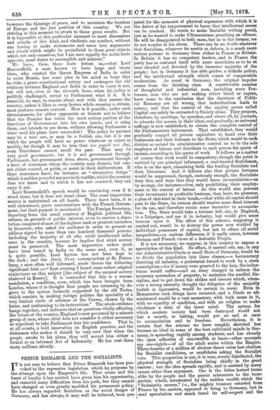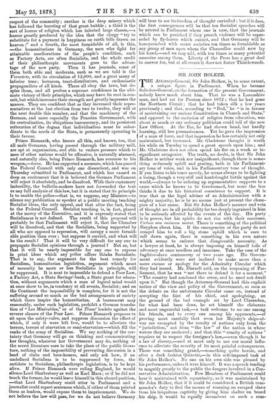PRINCE BISMARCK AND THE SOCIALISTS.
TT is not easy to believe that Prince Bismarck has been pro- .I. yoked to the repressive legislation which he proposes by the attempt upon the Emperor's life. That crime and the burst of loyalty it has excited have given him his opportunity, and removed many difficulties from his path, but they cannot have changed or even greatly modified his permanent policy. He has always regarded Socialism as the social danger of Germany, and has always, it may well be believed, been pre- pared for the measures of physical repression with which it is the defect of his temperament to fancy that intellectual errors can be crashed. He wants to make Socialist writing penal, just as he wanted to make Ultramontane preaching an offence. He will be disappointed in both cases, but as to the former, we do not wonder at his alarm. There can be no doubt whatever that Socialism, whatever its merits or defects, is a much more serious portent in Germany than either in France or Britain. In Britain it has no competent leaders, and in France the party has so confused itself with mere anarchists as to be at once dreaded and detested by the immense majority of the people; but in Germany it has able guides, a definite policy, and the intellectual strength which comes of comparative moderation. As usual in Germany, the original impulse comes from the thinking class. A considerable number of thoughtful and influential men, including some Pro- fessors, men who are not seeking either blood or rapine, have come to the conclusion that the doctrines of Politi- cal Economy are all wrong, that individualism leads to misery, and that the control of the mighty power called Capital can safely be entrusted to Society alone. They propose, therefore, by meetings, by speeches, and above all, by journals, to educate the masses in their ideas, and gradually, as universal suffrage is now established, to obtain the complete control of the Parliamentary instrument. That established, they would gradually compel all private capitalists to hand over their businesses and their fortunes to the State, which would in each district so extend its administrative control as to be the sole employer of labour, and distribute to each person his quota of income, according to his quota of work. It follows as a matter of course that work would be compulsory, though the point is omitted by our principal informant, a cool-headed Scotchman, who is on the spot, examining both the leading Socialists and their literature. And it follows also that private fortunes would be suppressed, though, curiously enough, the Socialists deny this, and state that they would leave accumulation—as by savings, for instance—free, only prohibiting their employ- ment in the control of labour. As this would also prevent their investment in profitable business, they have, we presume, a plan of this kind in their heads,—that while all capital should pass to the State, its owners should receive some fixed interest for its use, and therefore retain some incentive to accumula- tion. The State would take a fortune left, say, in England, to a Leipziger, and use it in industry, but would give SQMO interest upon it. The effect of this scheme, supposing it carried out, would be to destroy the power now wielded by individual possessors of capital, but not to efface all social inequalities,—a curious difference, if it really exists, between German and French views of a desirable Utopia.
It is not necessary, we suppose, in this country to expose a speculation of this kind. Its effect, if carried out, say, in any one Administrative Circle or small State of Germany, would be to divide the population into three classes,—a bureaucracy directing all industry, a proletariat forced to work by a stern conscription—for if money were granted to the lazy, the indus- trious would suffer—and an army charged to enforce the necessary surrenders of property, to maintain the needful dis- cipline, and to put down the strikes and e'meutes which, when- ever a strong minority thought the delegates of the majority foolish or oppressive, would be certain to occur. Even in Monasteries such things have occurred, and a Circle so ad- ministered would be a vast monastery, with both sexes in it, with no equality of condition, and with no religion to make obedience a duty of the inner mind. The system for which modern society had been destroyed would not last a month, or lasting, would put an end at once to accumulation and to freedom. Nevertheless, it is certain that the scheme we have roughly sketched has become an ideal in some of the best cultivated minds in Ger- many, is spreading rapidly among students, and has already the open adhesion of one-twelfth at least—other accounts say one-eighth—of all the adult males within the Empire. Three-fourths of a million of electors threw votes last election for Socialist candidates, or candidates asking the Socialist vote. This proportion is not, it is true, evenly distributed, the physical strength of Socialism being chiefly in the great centres ; but the idea spreads rapidly, and is assisted by many causes other than argument. One is the bitter hatred borne alike by the people and the poorer aristocrats to the bour- geoisie, which, intoxicated by the sudden wealth which the "Indemnity money," i.e., the mighty treasure extorted from France by the cannon, appeared to bring to Germany, lost in mad speculation and much fraud its self-respect and the respect of the commuity ; another is the deep misery which has followed the bursting of that great bubble ; a third is the sort of horror of religion which has infected large classes,—a horror greatly produced by the idea that the clergy " try to substitute for a payment in happiness on earth bills drawn on heaven ;" and a fourth, the most formidable of all, is this, —the humanitarians in Germany, the men who fight for attainable ameliorations of the people's condition, such as Factory Acts, are often Socialists, and the whole credit of their philanthropic movements goes to the advan- tage of the new party. Then it has journals, some of them both, able and moderate, such as we are told is the Vorwarts, with its circulation of 12,000, and a great many of inferior tone ; lecturers,. tract-distributors, and enthusiastic propagandists of all kinds. These all obey the laws, but de- spise them, and all profess a supreme confidence in the ulti- mate victory of their principles, which may have its root in con- ceit, but whichincreases their strength and greatly impresses the masses. They are confident that as they increased their repre- sentatives at the last election from two to twelve, they will at the next double this number, and that the machinery of the German, and more especially the Prussian Government, with its centralisation, its ubiquitous bureaucracy, and its persistent reiteration of the dogma that individualism must be subor- dinate to the needs of the State, is permanently operating in their favour.
Prince Bismarck, who knows all this, and knows, too, that all male Germans, having passed through the military mill, are apt at organisation, and able to endure pressure which to men of other nations would be offensive, is naturally alarmed, and naturally also, being Prince Bismarck, has recourse to his weapon,—force. He has supported a measure, which has passed the Federal Council with only one dissentient, and was on Thursday submitted to Parliament, and which has caused so deep an excitement that it is believed the German Parliament will reject it absolutely, and be dissolved. With their customary imbecility, the bulletin-makers have not forwarded the text or any full analysis of this law, but it is stated that its principle is to enable the police—that is, we suppose, any Minister—to silence any publication or speaker at a public meeting teaching Socialist ideas, the only appeal, and that after the fact, being to the Federal Council. Socialist teaching is, in fact, placed at the mercy of the Executive, and it is expressly stated that Socialismus is not defined. The result of this proposal will probably be that Parliament will reject it, that the Chamber will be dissolved, and that the Socialists, being supported by all who are opposed to repression, will occupy a more formid- able position than ever..; but suppose it carried, and what will be the result ? That it will be very difficult for any one to propagate Socialist opinions through a journal ? Not so, but that it will be nearly impossible for any one to express in print ideas which any police officer thinks Socialistic. That is to say, the argument for the best remedy for Socialism, humanitarian legislation, argument which must or necessity be more or less Socialistic in principle, will be suppressed. It is next to impossible to defend a Poor Law, a Factory. Act, a State Savings'-bank, a State grant for educa- tion, without arguments which a man of logical mind would at once show to be, in tendency, at all events, Socialist ; and on the Continent the impossibility is complete, for it is not the suffering around so much as the bad arrangements of society which there inspire the humanitarian. A bureaucrat may reasonably, under such legislation, prohibit a German transla- tion of "Les Miserables," or of the Times' leadels against the severer clauses of the Poor Law. Prince Bismarck proposes to sit upon the safety-valve, and suppress discussion the effect of which, if only it were left free, would be to alleviate the terrors, terrors of starvation or semi-starvation--which fill the ranks of the army of Socialism. We say nothing of the cer- tainty that Germany will go on thinking and communicating her thoughts, whatever her Government may do, nothing of the secret literature sure to take the place of the public litera- ture, nothing of the impossibility of preventing discussion in a land of clubs and beer-houses, and only ask how, if an undefined Socialism is to be suppressed by force, the antidote to Socialism, philanthropic legislation, is to be kept alive. If Prince Bismarck were ruling England, he would silence Lord Shaftesbury as well as Karl Marx ; or if he did not touch the former, he would leave himself in this absurd position, —that. Lord Shaftesbury could utter in Parliament and a journalist could report sentences which, if either of them printed them as leaders, would. expose them to imprisonment. We do not believe the law, will pass, for we do not believe Germany
will bear to see its freedom of thought curtailed ; but if it does, the first consequences will be that ten Socialist speeches will be uttered in Parliament where one is now, that the journals which can be punished if they preach violence will be super- seded by fly-leaves which cannot, and that Germany will be honeycombed with secret societies ten times as formidable as any group of men upon whom the Chancellor could now lay his hand,—and we may add, with ten times as many potential assassins among them. Liberty of the Press has a great deal to answer for, but at all events it does not foster Thistlewoods.



































 Previous page
Previous page